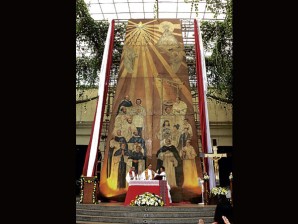
THE RESTORED San Lorenzo Ruiz mural is unveiled at the Holy Angel University on Oct. 18, the 25th anniversary of the canonization of the saint. It was used as a backdrop during the 1981 beatification of Lorenzo Ruiz in Manila. CONTRIBUTED PHOTO
ANGELES CITY—When Pope John Paul II led the beatification of Lorenzo Ruiz at the Rizal Park in Manila in 1981, a large mural depicting the lives of the first Filipino saint and his fellow martyrs on lawanit board served as the backdrop on stage.
In serendipitous ways, the mural ended up at Holy Angel University (HAU) in Angeles City, the first Catholic university in Central Luzon, ending years of being consigned to obscurity in a storage area somewhere in Quiapo, Manila.
At HAU, the restored piece is now called the San Lorenzo Ruiz mural.
“We know that the mural has historical value because it was the centerpiece of the first beatification in Church history that was held outside the Vatican. It has religious value because it was a relic, having been blessed and probably touched by a future saint, Pope John Paul II,” says Robby Tantingco, executive director of HAU’s Center for Kapampangan Studies (CKS).
Restored by HAU resident painter, Arnold Salunga, the 31-year-old mural was unveiled on Oct. 18, in time for the 25th anniversary of the canonization of the saint who refused to renounce his Catholic faith amid torture in Nagasaki, Japan
Journey
How did the mural turn up at the university? In-between are discoveries of Kapampangan connections.
The late architect Jose Maria V. Zaragoza, who was 69 years old in 1981, designed the mural and commissioned artisans to paint it for the outdoor ceremonies at Rizal Park.
Tantingco says the Archdiocese of Manila, which covered Ruiz’s home district of Binondo, must have asked Zaragoza to design the piece. The architect not only lived in Quiapo but was also a Knight Commander of the Order of St. Gregory the Great at the Vatican.
Information gathered by CKS showed that Zaragoza designed and built several landmarks, such as Meralco Center in Ortigas, the Sto. Domingo Church, the renovated Quiapo Church, the Archbishop’s Palace in Mandaluyong, the Philippine Airlines building in Makati City, the first SM department store, the Pink Sisters convent, Radio Veritas building, Virra Mall and the St. John Bosco chapel.
Zaragoza was half-Kapampangan. His mother, Rosario, was a member of the Velez-Infante clan of Guagua. His father was Elias Zaragoza, said to be the first licensed Filipino electrical and chemical engineer and first Filipino to graduate from Yale University.
“He belonged to the Zaragoza family of Quiapo, whose ancestors were the King of Spain’s representatives to Nueva Ecija during the tobacco monopoly, which is why a town there is named Zaragoza,” Tantingco says.
Donation
The architect’s son, Ramon Ma. Zaragoza, donated the mural to HAU in April 2011. An architect, author and historian, the younger Zaragoza’s ties with CKS began in 2005 when he came for the launch of a book by Prof. Lino Dizon.
He had only two wishes: Restore the mural and offer a Mass on his father’s centenary in December with the mural as backdrop.
When Tantingco’s team saw the 4-meter acrylic mural of eight panels in an unoccupied building owned by the Zaragozas, it was in a state of disrepair. Several panels were missing, and Salunga reconstructed some scenes through photographs of the 1981 event.
“Why this mural was left to deteriorate in a storage in Quiapo for more than 30 years, and why architect Ramon Zaragoza had to run to a private institution like the CKS for help, is an indication of how cultural treasures are treated in this country,” Tantingco said.
The San Lorenzo Ruiz mural, he says, is one of the elder Zaragoza’s works that reflected his deep spirituality and fidelity to the Catholic Church.